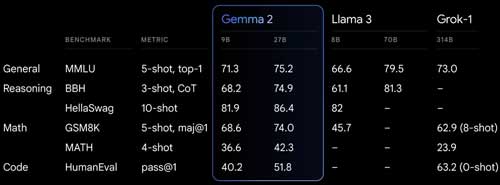Google Launches More AI Tools, Open Source AI Agent Platform
Google recently unleashed a slough of generative AI technologies, from the next generation of its open foundation model to an open source AI agent platform.
Late last month, the company announced Gemma 2, the latest version of its flagship open large language model (LLM). Gemma is family of lightweight, state-of-the-art open models built from the same research and technology used to create Google's closed-source AI model, Gemini.
The first Gemma models were released earlier this year. Gemma 2 builds on its predecessor, offering more power at lower cost.
"Available in both 9 billion (9B) and 27 billion (27B) parameter sizes, Gemma 2 is higher-performing and more efficient at inference than the first generation, with significant safety advancements built in," said Google. "In fact, at 27B, it offers competitive alternatives to models more than twice its size, delivering the kind of performance that was only possible with proprietary models as recently as December. And that's now achievable on a single NVIDIA H100 Tensor Core GPU or TPU host, significantly reducing deployment costs."
 [Click on image for larger view.] Gemma 2 (source: Google).
[Click on image for larger view.] Gemma 2 (source: Google).
Project Oscar
Google also recently open sourced a platform for AI agents to take care of project maintenance.
Project Oscar (standing for open source contributor agent architecture) was open sourced by the cloud giant at its I/O Connect event in Bengaluru, India.
It seeks to help point autonomous agents — one of the hottest areas of AI right now — at open source project maintenance. As Google described it in a blog post last week, Project Oscar is "a reference for an AI Agent that helps with open source project maintenance, starting with Go, a project with over 93,000 commits and 2,000 contributors, but you can imagine supporting all kinds of different projects."
Rather than generating, fixing, or explaining code for users in the development process like Copilot and other AI dev assistants, the tool focuses on the more mundane aspects of project maintenance, such as triaging issues, reviewing pull requests, and responding to comments, so developers can focus on the more creative aspects of their projects.
Its goals include:
- Reduce maintainer effort to resolve issues [note that resolve does not always mean fix]
- Reduce maintainer effort to resolve change lists (CLs) or pull requests (PRs) [note that resolve does not always mean submit/merge]
- Reduce maintainer effort to resolve forum questions
- Enable more people to become productive maintainers
Project IDX
This web-based workspace for full-stack app development was unveiled last year.
In a May update, the company said: "As of today, anyone can sign in with their Google account to start building with AI-assistance, collaboration capabilities, support for a broad range of frameworks and languages, as well as seamless integration with popular Google tools and products like Flutter and Firebase. And you can get to work quickly with over a dozen templates pre-loaded with the basic files and packages you need, or by importing your existing GitHub repo and its dependencies, or even starting with a blank slate."